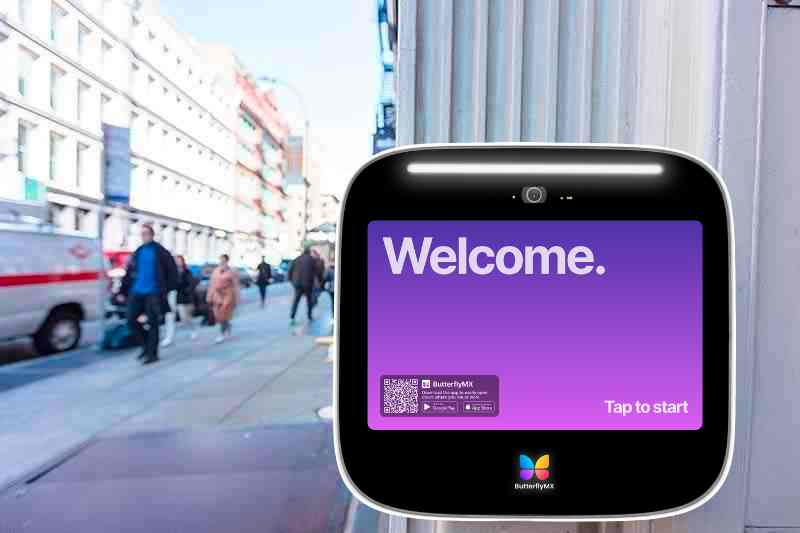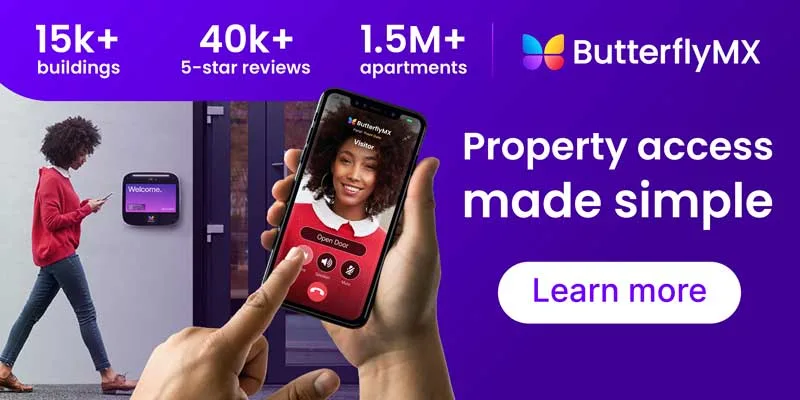Key takeaways
- A workplace visitor policy is a set of guidelines that ensure visitors are safe and don’t interfere with business operations.
- When creating a workplace guest policy for your property, consider delivery courier protocol, visitor logs, and tenant restrictions.
- You can use a visitor management system to help staff stay on top of visitors.

How does your building handle visitors in the workplace? Your answer could be the difference between a smooth day-to-day for your tenant or a negative experience that throws a lease renewal in question. Many properties institute a workplace visitor policy to ensure a seamless office visitor management system without disrupting other employees.
In this post, we explain what a workplace visitor policy is. We also outline what you should keep in mind when creating one. Then, we provide an example of a workplace guest policy. Finally, we explain how to implement one at your building.
This post covers:
- What is a workplace visitor policy?
- Important elements of a workplace visitor policy
- How to create a workplace visitor policy
- Commercial office visitor policy example
- How to implement a workplace visitor policy
- Workplace visitor policy FAQ
What is a workplace visitor policy?
A workplace visitor policy is a set of guidelines that manage the presence of visitors in an office or other commercial building.
What’s more, businesses welcome all sorts of visitors. From friends of employees to delivery couriers with boxes full of office supplies, visitors come and go daily. So, your job is to manage visitor safety and security — in addition to employee access.
Because workplace visitors include recurring deliveries and one-time job applicants, a robust, comprehensive visitor entry procedure is needed.
By creating a robust workplace guest policy, you’ll guarantee no visitors or employees are inconvenienced by long wait times or unauthorized guests. So, make sure your workplace management process for visitors maintains security on your property.
Watch how ButterflyMX works:
Important elements of a workplace visitor policy
You might know that you should have a workplace guest policy, but you might not know what it should cover.
The most important elements of an effective workplace visitor policy are:
- Delivery courier protocol
- Logging visitors
- Tenant restrictions
- Streamline access for contractors and service providers
- Restrict access to dangerous or restricted areas
1. Delivery courier protocol
Delivery couriers are one of the most common types of visitors your tenants will deal with. As such, you’ll have to oversee deliveries on two levels:
First, the business might receive commercial-grade deliveries, like large quantities of office supplies.
Then, on an individual level, employees might receive packages or get their lunches delivered.
When couriers arrive, it’s your job to decide how far into the building they go and where specifically they should drop their packages off. So, make sure your workplace guest policy addresses how delivery carriers gain access and which areas are off-limits to them.
2. Logging visitors
Many companies find it useful to maintain a visitor log book to keep track of every visitor and how long they were on the property.
In the past, offices had no option but to depend on analog pen-and-paper visitor log sheets to keep track of visitors. But paper records can be a hassle: visitors might have illegible handwriting, or paper records might degrade or go missing. As such, going digital with a visitor management system can help you iron out how to enforce your visitor policy.
3. Tenant restrictions
You might be managing a property for tenants with stringent security standards. For example, hospitals, schools, and offices all handle sensitive information. In that case, you might not want to allow outside visitors onto the property at all.
However, if you do want to let non-tenants into the building, you have a few options that will increase visitor security. For example, an interior security system will allow you to keep an eye on visitors at all times.
Alternatively, you might not allow personal visitors for employees and restrict access to vendors and delivery couriers.
4. Streamline access for contractors and service providers
Streamlining access for contractors and service providers has a direct impact on operational efficiency, security, and overall visitor experience.
A well-structured visitor policy not only expedites the entry process for contractors and service providers, but also enhances workplace security procedures by closely monitoring and regulating access. This proactive approach mitigates the potential risk of unauthorized personnel entering your workplace.
Moreover, a streamlined visitor sign-in system facilitates a positive visitor experience, reducing wait times and fostering a professional and organized workplace.
Ultimately, integrating effective access management for contractors and service providers maintains a secure, well-functioning, and welcoming work environment.
Pro tip: Choose a cloud-based visitor management system or front desk station that keeps a time-and-date stamped log of all entry events. What’s more, a cloud-based visitor entry system with an app sends temporary digital keys to guests that automatically disable after an allotted period of time.
5. Restrict access to dangerous or restricted areas
Restricting access to dangerous or restricted areas allows you to clearly delineate and enforce limitations to areas with inherent risks or confidential information.
These restrictions help prevent accidents, unauthorized access, and potential security breaches. What’s more, a robust visitor management security system not only helps in compliance with safety regulations but also establishes a framework for accountability.
In essence, enforcing proactive measures ensures a secure and controlled environment, and maintains the highest standards of safety within the workplace.
Pro tip: Restrict access to dangerous or restricted areas and ensure safety and security in the workplace by implementing a keypad for rooms that house sensitive material.
How to create a workplace visitor policy
Workplace visitor policies tend to follow the same general format, which includes a short introduction and different rules for different types of visitors.
To help you get started, below is an office visitor policy template you can edit to fit your business’s unique needs. But depending on your own management style and your security needs, you might relax these policies or add additional restrictions. In addition, if you anticipate another type of visitor, you might add another subsection.

Commercial office visitor policy example
Here are some examples of what to include in your visitor policy:
PURPOSE
These guidelines ensure that visitors are safe during their time on our property. Additionally, these guidelines will ensure that visitors won’t negatively affect employees’ ability to work.
When a visitor is on the property, employees must ensure that visitors abide by posted safety rules and regulations. You might also add more categories of visitors if you expect staff to invite both personal and professional guests.
General policy
No matter what kind of visitor is on the premises, every visitor has to follow similar procedures.
- All visitors must sign in at the front desk and sign back out.
- The visitor must be assigned a temporary ID badge.
- An employee must accompany their visitor at all times.
Personal visitors
Personal visitors in the workplace are only allowed during the standard working hours of 9 A.M. to 5 P.M.
Vendors and contractors
Vendors, contracts, and other official visitors must be pre-registered and have their credentials displayed before entering the property.
To download this office visitor policy as a PDF, click here. >>

How to implement a workplace visitor policy
A workplace guest policy is key to keeping your property secure and tenants happy. However, a policy enforced on paper and a policy that visitors actually follow are two very different things.
To help your staff implement your workplace guest policy, you can invest in security and access control technology that simplifies the visitor experience.
For example, the best policies work in tandem with innovations like electronic databases and hardware like visitor badge systems. Access control systems like ButterflyMX create a log of visitors. This makes it easier for visitors to access the parts of the building they need. Additionally, they do this while maintaining high levels of security for the rest of the building.
Workplace visitor policy FAQ
Here are answers to five of your frequently asked questions about workplace visitor policies:
- Why is a visitor policy important?
- What is a visitor access system?
- Is access control the same as visitor management?
- How can companies manage deliveries?
- What happens with unauthorized visitors?
1. Why is a visitor policy important?
Visitor policies are important because they implement a process that welcomes guests, while ensuring the safety and security of your staff, clients, and workplace assets.
What’s more, visitor management system software helps facilitate convenient and secure access for guests.
2. What is a visitor access system?
A visitor access system is an electronic process that streamlines entry for guests, service providers, and delivery couriers.
What’s more, a smart visitor access system with a camera allows you to visually verify individuals before granting them access to your workplace.
3. Is access control the same as visitor management?
While access control is not the same as visitor management, it plays a crucial role in facilitating safe and secure access for guests and visitors.
4. How can companies manage deliveries?
Companies can manage package deliveries by implementing an access control system or package room that facilitates seamless delivery management.
Inadequate package management can lead to parcels being dropped off in the lobby, which can look unprofessional and lead to packages being stolen.
So, choose a package management solution that sends delivery passes to couriers so they can drop-off parcels securely. In fact, a package room that’s integrated with an access control system sends you real-time notifications when a package is delivered.
5. What happens with unauthorized visitors?
The protocol for handling unauthorized visitors varies depending on your specific workplace visitor policy.
However, if you implement an access control system like a video intercom, an unauthorized visitor would simply be denied access and wouldn’t be able to enter the premises.
Because video intercoms empower you to launch two-way video calls with guests, you can grant or deny access to visitors without needing to physically let them in.







